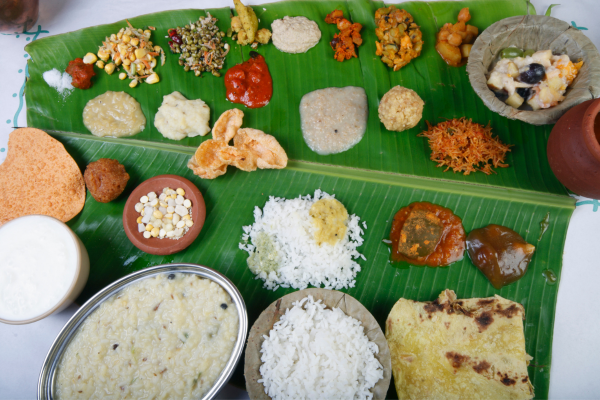Dive into the Pongal panorama: A four-day fiesta of flavour, flames, and farmyard frolic!
Brace yourself for a journey into the vibrant mosaic of Pongal, a Southern Indian spectacle that transcends the ordinary harvest festivities – a four-day carnival of traditions, tales, and tantalising tastes. Hold on to your kolams and get ready to embark on a rollercoaster of customs as we unravel the vibrant tapestry of Pongal. Our voyage through the Pongal story is a kaleidoscope of colours, eccentric traditions, and gastronomic delights that will leave you wanting more. From the fiery purging of the past in Bhogi Pongal to the daring bull-taming show of Mattu Pongal and the lovely symphony of appreciation in Thai Pongal, our adventure will leave you wanting more. So fasten your seat-belts and get ready to go on an adventure that will take you through the cooking pots, and bonfires that are a part of the Pongal holiday, where every day is a celebration and every moment is loaded with fun!
Harvesting traditions and Sangam heritage
Central to the festival of Pongal, is a creation that surpasses the boundaries of gastronomy: the cuisine that bears the same name. Consider a scenario wherein pots of freshly harvested rice, velvety milk, and the golden sweetness of jaggery harmoniously combine to produce a harmonious blend of tastes that reflects the agrarian traditions of the region. It is a culinary homage to the fertile lands of Tamil Nadu, and not merely a dish.
Pongal, which dates back nearly two millennia, is documented in the Sangam literature; a comprehensive compilation of ancient Tamil poetry and epics. These esteemed literary pieces contribute to the conservation of the festival through their vivid portrayal of its ancient observance.
Pongal is not solely a gustatory extravaganza; rather, it is an occasion commemorating the agricultural pulse of the area. Traditionally celebrated in mid-January, the festival signifies the passage of time from the winter solstice to the season of harvest, which is anxiously anticipated. Farmers convey their appreciation to Surya, the Sun God, as the fields mature subtly under the sun’s benevolent influence, for supplying the essential heat and energy necessary for the successful production of crops.
During the Tamil month of Thai, which occurs between January 13th and 16th, the festival of Pongal is in full swing. This momentous occasion coincides with the sun’s transit through Capricorn, a celestial meeting that establishes the atmosphere for exuberant festivities.
Pongal: An exquisite fusion of cuisine and nature
At the apex of Pongal celebrations, “Thai Pongal”, the day dedicated to the traditional Pongal dish, is observed. This ceremonial preparation serves a purpose beyond mere gastronomy; it represents an expression of reverence towards the Sun God through the presentation of the initial harvest produced as a token of appreciation.
The Pongal custom transforms into a communal undertaking within households and communal areas. Imagine a gathering of individuals adorning the Pongal dish to its capacity, which not only signifies plenty but also embodies a sense of unity and prosperity. This festivity transcends the boundaries of individual house in olds, fostering a collective sentiment of unity and gratitude.
Pongal has undergone adaptations to the ongoing processes of urbanisation and modernity as time progresses. Notwithstanding this, the festival’s fundamental principles have remained unaltered, serving as evidence of its sturdy nature. Pongal, fundamentally, constitutes a commemoration of gratitude, unity, and esteem for the environment. The vibrant hues of tradition and communal spirit continue to adorn the landscapes of Tamil Nadu, contributing to the flourishing of a cultural mosaic.
Therefore, while immersed in the celebrations of Pongal in Tamil Nadu, bear in mind that it is more than a mere festival; rather, it serves as a vibrant and tangible illustration of the lasting heritage of a locality that harmoniously merges its agricultural origins and cultural fabric.
Unveiling the kaleidoscope of Pongal: A four-day extravaganza
Pongal is a multi-day festival, it goes beyond the borders of a conventional harvest festival and is a celebration that is filled with a kaleidoscope array of activities. In addition to the enticing scents of the Pongal food, the celebration of Pongal takes place over the course of four days, each of which is packed with the historical depth, cultural flavour, and peculiar customs that distinguish it from other celebrations.
Bhogi Pongal: The bonfire of past and present
Beginning the celebrations associated with Pongal is Bhogi Pongal, a day laden with historical importance and a unique ritualistic purification. Imagine dwellings adorned with vivid kolams, which are conventional rangoli patterns, and families in the process of replacing outdated items with new ones. The act of discarding old items does not merely represent physical decluttering; instead, it serves as a symbolic gesture of relinquishing pessimism and welcoming optimism onto the blank slate that awaits in the coming year.
However, there is a catch: it is not as simple as simply eliminating debris. In some regions of Tamil Nadu, it is an odd tradition to symbolise the victory of good over evil by incinerating discarded objects in a conflagration. This practice dates back centuries. A bonfire of the past that is both literal and symbolic in essence, it is an intriguing fusion of ancient customs and contemporary arrangement.
Thai Pongal: The culinary symphony of gratitude
After that, the day in concern acquires utmost importance as Thai Pongal is dedicated to the expression of gratitude towards Surya, the deity associated with the sun. As the traditional Pongal meal is meticulously prepared, the occasion undergoes a complete transformation into a gastronomic extravaganza, wherein every element assumes an even greater significance.
Let us contemplate the following: the symbolism of recently harvested rice signifies prosperity; the milk represents purity; and the golden jaggery signifies sweetness. As the concoction boils over, it becomes more than a sensory delight; instead, it symbolises a communal display of gratitude towards the Sun God, who is considered the fundamental provider of life. The Pongal feast undergoes a metamorphosis into a cultural communion with the environment, and the culmination of the festival is the assembly of individuals to commemorate the abundance of resources.
Mattu Pongal: A bovine bonanza
An expected change occurs when Mattu Pongal is instituted – A day dedicated to honouring the substantial contribution that livestock make to the agricultural sector. The focal point of attention, however, is the traditional Jallikattu, an ancient bull-taming sport, rather than the streets adorned with vibrant rangoli.
Jallikattu transcends being a mere spectacle; it is an enduring tradition that serves as a testament to the profound bond that can be established between beings, including humans and animals. Spectators witness a visual spectacle of valour and unity as they attempt to subdue vicious bulls while competing in the event. In observing Mattu Pongal, we demonstrate reverence not only for cattle but also for the agricultural legacy that permeates the very essence of Tamil Nadu society.
Kaanum Pongal: A day of bonding and exploration
As the Pongal feast draws to a conclusion, Kaanum Pongal emerges as a day of relaxation, exploration, and connection, particularly among members of the same family. Families go out to beautiful places, such as riverbanks and parks, to create a picture-perfect scenario of happiness and togetherness that is excellent for a postcard. On the other hand, here is the exciting twist: it is not simply a day trip.
In addition, the Kaanum Pongal festival includes a special rite in which ladies pray for the health and happiness of their brothers. Imagine a scene in which sisters are seen wrapping multicoloured threads around the wrists of their brothers as a sign of protection and affection amongst siblings. It is a charming ritual that brings a personal touch to the larger canvas of Pongal celebrations, which are already quite enjoyable.
In conclusion, the four days of Pongal are an extraordinary spectacle within the vibrant tapestry of Indian holidays, revealing a tapestry of history, culture, and eccentric traditions in addition to gastronomic delicacies.
Enjoying the Pongal potpourri: A celebration of taste, joy, and laughter!
It is time to let the joy, the tastes, and the customs dance in our hearts as we say goodbye to the Pongal celebration. Over the course of four days, Pongal is more than simply a festival; it’s a cultural carnival that includes fireworks, bravado in taming bulls, culinary crescendos, and colourfully interwoven sibling connections.
However, you won’t want to leave just yet! It is interesting to see how other parts of India celebrate Pongal as we fold our own flags. Sugarcane trading and the sweet game of ellu-bella (a mixture of sesame nuts and jaggery) are hallmarks of the event in Karnataka. The four-day Sankranti holiday in Andhra Pradesh is just as riotous as Pongal, complete with rangoli contests, kite flying wars, and family feasts.
Pongal brings together people from all over India in a festive tapestry that is as varied and special as the country itself, whether you are in Karnataka sharing the sweetness of ellu-bella or adorning yourself with a Pongal pot in Tamil Nadu.
With the Pongal sun setting with memories and warmth in its wake, let us take the joy of gratitude, unity, and spice with us. Until the next Pongal, when the festivities will continue with dancing bulls, simmering pots, and laughter that reverberates throughout Tamil Nadu and beyond!
Sreeni,
Simplyweight





